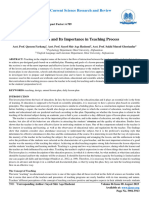Position Paper
Position Paper
Uploaded by
Emerald James ZabalaCopyright:
Available Formats
Position Paper
Position Paper
Uploaded by
Emerald James ZabalaCopyright
Available Formats
Share this document
Did you find this document useful?
Is this content inappropriate?
Copyright:
Available Formats
Position Paper
Position Paper
Uploaded by
Emerald James ZabalaCopyright:
Available Formats
Emerald James Zabala
STEM II - Coral
Should sex education be taught in school?
Sex education has been a controversial topic for decades, and debates still rage on across
the Philippines regarding its implementation in schools. Proponents of sex education argue that
the earlier students learn about the subject, the better able they will be to make informed
decisions about their sexual health. They also contend that comprehensive sex education helps
reduce pregnancy, sexually transmitted diseases, and other sexual health risks. On the other
hand, opponents believe that sex education is too explicit and could encourage early sexual
activity.
This position paper argues that sex education should be taught in schools, as it is an
important tool in helping students make good decisions about their sexual health. Research has
consistently shown that comprehensive sex education, which is rooted in evidence-based
practices, is the most effective in reducing risky sexual behaviors and increasing sexual health
knowledge. It can also help reduce the stigma of talking about sensitive topics like contraception
and sexually transmitted infections and helps foster an atmosphere of open communication
between parents and their children.
Furthermore, sex education classes should be tailored to each student’s age and stage of
development. By providing age-appropriate lessons, students can learn about their bodies,
anatomy, and reproductive health in an environment that is comfortable and safe. In addition,
teachers should be trained in best practices for teaching sex education and should be given the
opportunity to update their knowledge and skills on a regular basis.
Finally, it is important to note that sex education should go beyond biological facts and
provide students with a variety of options for making healthy decisions. This can include
teaching them about the difference between healthy and unhealthy relationships, how to use
contraception properly, and how to recognize the signs of sexual abuse. Additionally, students
should be taught the importance of consent, and that no one should ever feel pressured into
having sex.
In conclusion, sex education should be taught in schools as it is an effective way to
reduce risky sexual behaviors, increase sexual health knowledge, and promote healthy decision-
making. It is important that sex education is tailored to each student’s age and stage of
development, and that teachers are given the necessary training and resources to provide
comprehensive lessons. Finally, sex education should go beyond biology and provide students
with a variety of options for making healthy decisions.
You might also like
- Validation Criteria ChecklistDocument3 pagesValidation Criteria Checklistbacharnaja50% (2)
- How To Implement Sex Education Effectively in Sri Lanka PDFDocument7 pagesHow To Implement Sex Education Effectively in Sri Lanka PDFsachintyarajapakse0% (1)
- Lesson 4 - Planning A Written TestDocument2 pagesLesson 4 - Planning A Written TestElvira CuestaNo ratings yet
- White Paper FinalDocument9 pagesWhite Paper Finalapi-302316164No ratings yet
- Year 8 Health Sex Ed Unit PlanDocument9 pagesYear 8 Health Sex Ed Unit Planapi-334786948No ratings yet
- Argumentative EssayDocument2 pagesArgumentative Essayuyarriana63No ratings yet
- RRL With CommentsDocument6 pagesRRL With Commentsfatima naranjoNo ratings yet
- Research Edited RRLDocument12 pagesResearch Edited RRLKathlyn Jones Romboa OclarinoNo ratings yet
- LolDocument10 pagesLolMark Mangompit ArenilloNo ratings yet
- 4B ScriptDocument2 pages4B ScripthuyenhalleyNo ratings yet
- Copy of ArtefactsDocument10 pagesCopy of ArtefactsFarel ThompsonNo ratings yet
- Enrichment Learning Activity: Joycel Labog MARCH 1, 2023 Beed - 3B Prof. Ronaldo Santiago Activity 2 Gender and SocietyDocument3 pagesEnrichment Learning Activity: Joycel Labog MARCH 1, 2023 Beed - 3B Prof. Ronaldo Santiago Activity 2 Gender and SocietyJesamel V. CañezoNo ratings yet
- Iyot 2Document6 pagesIyot 2Chrisdhen John CastilloNo ratings yet
- Sex EducationDocument1 pageSex EducationRommel Villaroman EstevesNo ratings yet
- Final 1Document27 pagesFinal 1Marnz BulahanNo ratings yet
- Percieved Benefits of Sex Education AmonDocument25 pagesPercieved Benefits of Sex Education Amonnafisatibidun954No ratings yet
- Knowledge of Sexual Education and Awareness of Access To ContraceDocument12 pagesKnowledge of Sexual Education and Awareness of Access To ContraceBalaji DeenNo ratings yet
- Bahan Debat 2024Document20 pagesBahan Debat 2024Screen PrintingNo ratings yet
- Research Paper DraftDocument6 pagesResearch Paper DraftNatalia StornelloNo ratings yet
- Sex Education in The PhilippinesDocument9 pagesSex Education in The PhilippinesJOHN DIEZEL AMPILNo ratings yet
- Nursing Research MethodologyDocument23 pagesNursing Research MethodologynickanelNo ratings yet
- Eapp Sex EdDocument2 pagesEapp Sex EdJoy CabalteaNo ratings yet
- ProposalDocument4 pagesProposaljustinerenio7No ratings yet
- Sex EducationDocument3 pagesSex Educationgothix666No ratings yet
- Effects of Integrating Sex Education On Curriculum As Perceived by Senior High School Students of Don Jose Integrated High School S.Y. 2019 - 2020Document17 pagesEffects of Integrating Sex Education On Curriculum As Perceived by Senior High School Students of Don Jose Integrated High School S.Y. 2019 - 2020KylaMay GarciaNo ratings yet
- Sex Education A Sample SpeechDocument1 pageSex Education A Sample SpeechMindo Clark AlexisNo ratings yet
- Position PaperDocument3 pagesPosition PaperOnat MirabelNo ratings yet
- SEX EDUCATION IN SCHOOLS - FullstudyDocument41 pagesSEX EDUCATION IN SCHOOLS - FullstudyMa Nenita L Magallanes100% (1)
- Why Do Young People Need Comprehensive Sexuality Education?Document3 pagesWhy Do Young People Need Comprehensive Sexuality Education?ItsClarenceNo ratings yet
- Implementation of Sex Education in Secondary Students FINALDocument31 pagesImplementation of Sex Education in Secondary Students FINALjiantorrecampo29No ratings yet
- Sex Education Is Instruction On Issues Relating ToDocument4 pagesSex Education Is Instruction On Issues Relating ToKong Shi HaoNo ratings yet
- SEX EDUCATIOscript UnfinishDocument11 pagesSEX EDUCATIOscript UnfinishSITI NURRAUDAH BINTI RAFIZ (BG)100% (1)
- An Evaluation of Introducing Sex Education Through Monthly Seminar To The Senior High School StudentsDocument19 pagesAn Evaluation of Introducing Sex Education Through Monthly Seminar To The Senior High School StudentsFrancis Troy SundoNo ratings yet
- Elementary Students Being Taught of Sex EducationDocument3 pagesElementary Students Being Taught of Sex EducationAccel FiestadaNo ratings yet
- Research Sex EducationDocument5 pagesResearch Sex EducationIvy Shenn CababatNo ratings yet
- Sex Education Literacy Stem 11 A.Document54 pagesSex Education Literacy Stem 11 A.Bangtan SeonyeondanNo ratings yet
- The Perception of Teenagers in Purok 5, Minante I, Cauayan City, IsabDocument16 pagesThe Perception of Teenagers in Purok 5, Minante I, Cauayan City, IsabMJ Garma GammadNo ratings yet
- The Role of Parents in Sex Education: How Can Parents Be Better Equipped To Provide Accurate and Comprehensive Information To Their Children?Document7 pagesThe Role of Parents in Sex Education: How Can Parents Be Better Equipped To Provide Accurate and Comprehensive Information To Their Children?RaashiNo ratings yet
- Sexed Oral CommDocument8 pagesSexed Oral CommJhozane SiagaNo ratings yet
- THBT Sex Education Should Be Taught at SchoolDocument3 pagesTHBT Sex Education Should Be Taught at SchoolMahala Wida Choiriyah100% (1)
- Condoms in High Schools Research PaperDocument8 pagesCondoms in High Schools Research Paperxjcwzfrif100% (1)
- Thesis Group 4 DraftDocument24 pagesThesis Group 4 DraftJoshyne BernalesNo ratings yet
- Argumentative EssayDocument4 pagesArgumentative Essaymiriam martinezNo ratings yet
- Iep-Jeremy BakerDocument11 pagesIep-Jeremy Bakerapi-345281048No ratings yet
- Sex EducationDocument21 pagesSex EducationKelly Efferson100% (1)
- SHS Research TEMPLATEDocument7 pagesSHS Research TEMPLATEraffymohammad3No ratings yet
- Position Paper in General Ethics: Implementation of Sex Education in Elementary Level in The PhilippinesDocument10 pagesPosition Paper in General Ethics: Implementation of Sex Education in Elementary Level in The PhilippinesRed David BallesterosNo ratings yet
- Background of The StudyDocument12 pagesBackground of The StudyFrancismae LanadoNo ratings yet
- Effects of Sex Education Adoption in Schools: Student's Name Professor' Name Institution Affiliation Assignment Due DateDocument6 pagesEffects of Sex Education Adoption in Schools: Student's Name Professor' Name Institution Affiliation Assignment Due DateEdwin OtienoNo ratings yet
- Sex EducationDocument5 pagesSex EducationNadeene Corpuz SubradoNo ratings yet
- Sex Education Is Instruction On Issues Relating To Human SexualityDocument5 pagesSex Education Is Instruction On Issues Relating To Human Sexualityprincess bulusanNo ratings yet
- Running Head: Youth Empowerment in Sex Education 1Document56 pagesRunning Head: Youth Empowerment in Sex Education 1Mendoza Jacky LynNo ratings yet
- Research Paper Chapter 1-2Document16 pagesResearch Paper Chapter 1-2Sherene UmpiaNo ratings yet
- Should Sex Education Be Taught in SchoolDocument2 pagesShould Sex Education Be Taught in SchoolbuttonmushroomsNo ratings yet
- Debate 2Document20 pagesDebate 2FarHan AquariusNo ratings yet
- Final Manu Sex EdDocument29 pagesFinal Manu Sex Eddee jayNo ratings yet
- ETR GetReal MiddleSchool TeacherGuide SAMPLEDocument470 pagesETR GetReal MiddleSchool TeacherGuide SAMPLESylvia Smith BryantNo ratings yet
- Homophobic BullyingDocument2 pagesHomophobic BullyingLina KostarovaNo ratings yet
- Comprehensive Sexuality EducationDocument11 pagesComprehensive Sexuality EducationMonica GrinczukNo ratings yet
- The Problem and Its BackgroundDocument105 pagesThe Problem and Its BackgroundFaye ReyesNo ratings yet
- Why Sex Education Is Important For Young PeopleDocument3 pagesWhy Sex Education Is Important For Young PeopleSebastián VegaNo ratings yet
- Sex Education Perception of Teacher Trainees In Uttar Pradesh (India)From EverandSex Education Perception of Teacher Trainees In Uttar Pradesh (India)No ratings yet
- Pattern of DescentDocument13 pagesPattern of DescentEmerald James ZabalaNo ratings yet
- Journal Article MaSK qUANTIDocument6 pagesJournal Article MaSK qUANTIEmerald James ZabalaNo ratings yet
- DRRRQ2 - Module 1 Landslide 2024Document6 pagesDRRRQ2 - Module 1 Landslide 2024Emerald James ZabalaNo ratings yet
- Extempo Pointers 2Document7 pagesExtempo Pointers 2Emerald James ZabalaNo ratings yet
- Practical Research Paper TemplateDocument18 pagesPractical Research Paper TemplateEmerald James ZabalaNo ratings yet
- Inbound 8592683717253462756Document20 pagesInbound 8592683717253462756Emerald James ZabalaNo ratings yet
- Baroque StyleDocument2 pagesBaroque StyleEmerald James ZabalaNo ratings yet
- 2I Day ReadingDocument2 pages2I Day ReadingEmerald James ZabalaNo ratings yet
- Argumentative Essay pt1Document2 pagesArgumentative Essay pt1Emerald James ZabalaNo ratings yet
- Interior Design Thesis TopicsDocument6 pagesInterior Design Thesis Topicsgjgcnp6z100% (2)
- Useful Educational WebsiteDocument3 pagesUseful Educational Websitehazima mysNo ratings yet
- APJ Abdul Kalam Technological University Thiruvananthapuram: Academic SectionDocument3 pagesAPJ Abdul Kalam Technological University Thiruvananthapuram: Academic SectionJijo JohnNo ratings yet
- Lean Manufacturing PractitionerDocument11 pagesLean Manufacturing PractitionerThiago LealNo ratings yet
- Nick C. Gador-Carol-An-National-High-School-Grade-7-Tip-Day-3Document13 pagesNick C. Gador-Carol-An-National-High-School-Grade-7-Tip-Day-3Nick Cris GadorNo ratings yet
- Pinto pm5 Inppt 06Document21 pagesPinto pm5 Inppt 06Kamal TamimNo ratings yet
- 45 45 90Document3 pages45 45 90Kren KyeNo ratings yet
- 7W Lesson PlanDocument7 pages7W Lesson PlanPierre TomaselloNo ratings yet
- Brochure EeDocument4 pagesBrochure EeNadika Deemantha PeirisNo ratings yet
- 9th Grade Syllabus - Modern World HistoryDocument2 pages9th Grade Syllabus - Modern World Historyapi-327122237No ratings yet
- Personal Statement UCASDocument1 pagePersonal Statement UCASJoseluRuiz97100% (1)
- Mahatma Gandhi Central UniversityDocument3 pagesMahatma Gandhi Central UniversityAmitesh TejaswiNo ratings yet
- Inquiry MethodDocument2 pagesInquiry MethodSamsung Tab4No ratings yet
- SSW Life Skills Practice CoDocument19 pagesSSW Life Skills Practice Coapi-3401676270% (1)
- Microskills LessonDocument4 pagesMicroskills Lessonapi-544190546No ratings yet
- Supervision of Extra-Class ActivitiesDocument19 pagesSupervision of Extra-Class ActivitiesHANNAH MAE ORELLA100% (1)
- HSOE Lesson Plan Template TEL7170: Technology in The CurriculumDocument4 pagesHSOE Lesson Plan Template TEL7170: Technology in The Curriculumapi-534596308No ratings yet
- TREVARTHEN, GRATIER E OSBORNE. The Human Nature of Culture and EducationDocument20 pagesTREVARTHEN, GRATIER E OSBORNE. The Human Nature of Culture and EducationCarolina MarquesNo ratings yet
- B. Tech Cse (Aiml) Syllabus 2022 FullDocument287 pagesB. Tech Cse (Aiml) Syllabus 2022 FullpraisyNo ratings yet
- Part 1 (Facilitating Learning) : Module 1 MetacognitionDocument29 pagesPart 1 (Facilitating Learning) : Module 1 MetacognitionJuana Arapan ArvesuNo ratings yet
- CVDocument4 pagesCVGlicelyn SantillanaNo ratings yet
- JHCSC CatDocument1 pageJHCSC CatLovella Joy B. OniotNo ratings yet
- Q4 English 2ND Cot 2023Document11 pagesQ4 English 2ND Cot 2023hazel.martinNo ratings yet
- Improving Reading Comprehension Ability of Grade Eight Students at SMP Bopkri 3 Yogyakarta by Using Mind MappingDocument121 pagesImproving Reading Comprehension Ability of Grade Eight Students at SMP Bopkri 3 Yogyakarta by Using Mind MappingAdnan Mulya RNo ratings yet
- Lesson Plan ExponentsDocument8 pagesLesson Plan ExponentsNaya NayazaNo ratings yet
- Lesson 6: Food and Nutrition Myths and Misconceptions Related To Physical Activity and Sport PerformanceDocument4 pagesLesson 6: Food and Nutrition Myths and Misconceptions Related To Physical Activity and Sport PerformanceFaxman Cavan SingcoNo ratings yet
- Music History Research Paper TopicsDocument7 pagesMusic History Research Paper Topicsfvg2005k100% (1)
- Lesson Plan and Its Importance in Teaching Process: International Journal of Current Science Research and ReviewDocument13 pagesLesson Plan and Its Importance in Teaching Process: International Journal of Current Science Research and Reviewsao rayouNo ratings yet


































































































